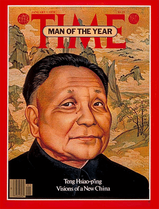China's TransFormation
“It doesn’t matter if a cat is black or white, so long as it catches mice.” Deng Xiaoping
When Deng Xiaoping came to power in 1979 this was his philosophy as matters related to the economy of China. In 1979, the per capita income of China was less than $100 USA. By the time he stepped down in 1992, several hundred million Chinese citizens had been lifted out of poverty, and China was rapidly becoming stronger, richer and more modern. How did this happen? Deng Xiaoping became Communist party leader in 1978 and launched his economic program of modernization. He pioneered "socialism with Chinese characteristics" and Chinese economic reform, also known as the "socialist market economy," and opened China to the global market. This means that business or owned and regulated by the community as a whole. A switch from the government running and regulating everything. Corporation verses competition guides the economy.
|
With the goal of modernizing China and turning it into a global power, Deng released his plan known as the “Four Modernizations”. The Four areas or focus were farming, industry, science and technology, and military. In the area of farming he brought in experts from around the world to train his farmers using modern techniques such hybrid seeds and modern machinery. To modernize industry he made many visits to Japan and learned from their modern production facilities, many that were using robotics for production. Some of these visits were to Toyota and Honda factories. Science and technology was improved by allowing Chinese students the opportunity to leave China for college and study abroad in Europe and the United States and upon graduation return with this wealth of knowledge. Deng also visited many countries in Europe and the United States. This was a huge difference from prior leaders, many of which never left China their entire life.
The last area was in terms of the military. After their humiliating defeat to the Japanese in World War II, China vowed that it would protect itself in the future. Today, China has the largest army in the world and full nuclear capabilities. It has made huge advancements especially in its navy. Today, it is the second strongest military in the world, right behind the USA. China also relies very little on imports of food and very few Chinese are undernourished. All of this improvements can be attributed to Deng Xiaoping. Stop & Watch video on right and answer questions |
Xiaoping Comes to Texas"To get rich is glorious." Deng Xiaping
|
|
|
Although Deng believed that open and free markets would encourage growth, he did not believe that political freedoms should also be changed. In 1989, a large student led demonstration that called for freedom of speech and the press was eventually brutally stopped by the Chinese military. For all the economic reforms Deng made, political reform did not occur.
1. Lack of political freedoms 2. Gap between rich and poor increased 3. Corruption and crime increased Watch video on left and answer questions, Current China |
Resources (Information on website taken from websites below)
http://rt.com/business/194264-china-surpass-us-gdp/
http://rt.com/business/194264-china-surpass-us-gdp/
https://hbr.org/resources/images/article_assets/2013/11/labormarket.gif

